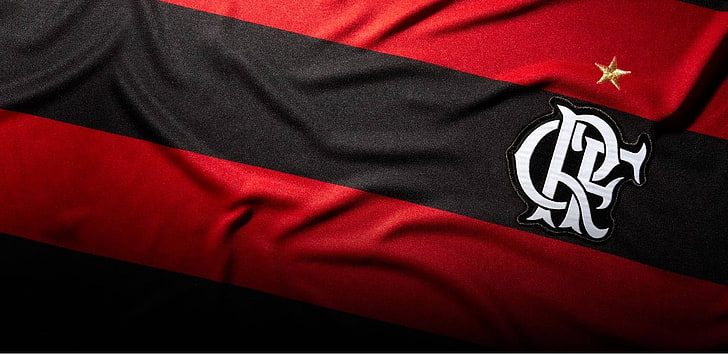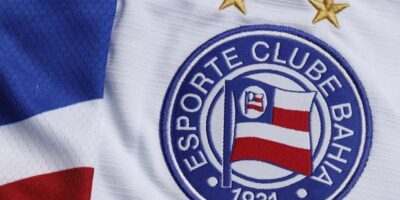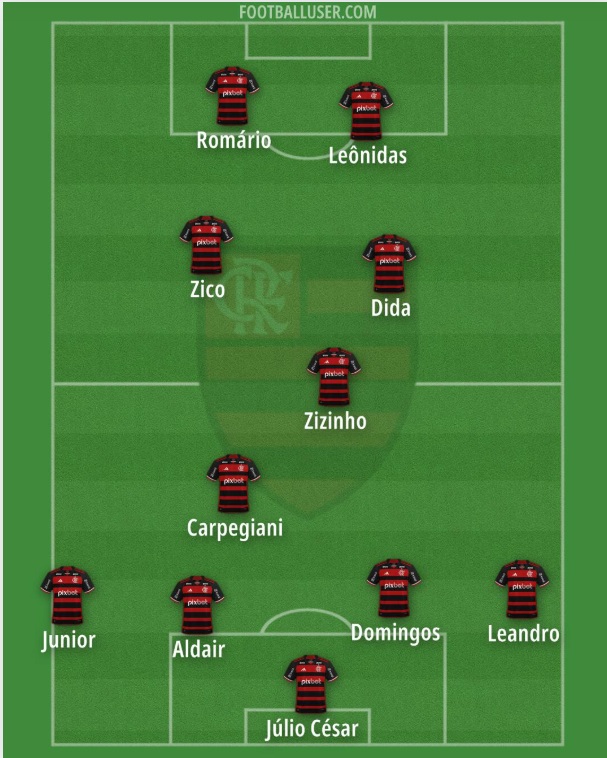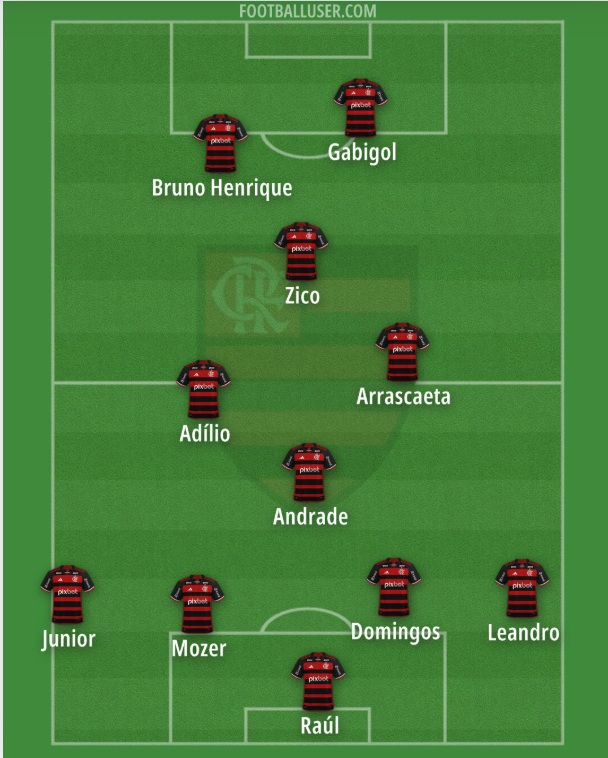Motivated by the last article posted on this blog about Gabigol’s place in the all-time great players from Flamengo ranking, I have decided to write this text with my All-Time Best Flamengo XI.
Attention, it is essential to explain the difference between “greatest” and “best”, When speaking about the greatest, we should mainly take in consideration the role the player had in the club’s big achievements. Here, I will focus on the best, meaning the level of play and skill from the athlete and how he compared to his peers, especially to the world class players in his position (National Team play will also have an influence here), while defending Flamengo.
Therefore, next my All-Time Best Flamengo eleven (each player stats and titles taken from: Hall do Manto: escolha o seu time dos sonhos de todos os tempos | flamengo | ge ):
GOALKEEPER
Júlio Cesar (1997-2004/2018): 287 games, 125 wins, 70 draws and 92 defeats.
Defending the carioca club, Júlio Cesar was essential in the legendary 2001 state championship title. He played for Flamengo from his youth career days until 25 years of age. In that period, he won the 2004 Copa America for Brazil as the starting Goalkeeper, defending a penalty in the final against Argentina.
Main titles: 2001 and 2004 Rio de Janeiro State Championships and 2001 Champions Cup
It is important to say that I’ve pondered about choosing Raul Plassmann but did not since he joined Flamengo in the last stage of his career, not in his prime anymore. However, he would certainly be in All Time Greatest Flamengo XI, because he was the Goalkeeper from the most victorious time in Zico’s era,
RIGHT BACK
Leandro (1978-1990): 414 games, 239 wins, 98 draws and 77 defeats; 14 goals.
A true world class talent at the right back position, “Peixe Frito” (fried fish, his nickname in Portuguese) was a complete player, one of the all-time greats at his role, and a starter for the legendary 1982 World Cup Brazil team, representing Flamengo. At an interview, competent Brazilian Journalist Mauro Cezar Pereira ranked Leandro among the five best players he saw live at a stadium, alongside geniuses like Pelé, Zico, Maradona and Messi.
Main titles: 1978, 1979, 1981 and 1986 Rio de Janeiro State Championships, 1980, 1982, 1983 and 1987 Brazilian Leagues, 1981 Libertadores and 1981 Intercontinental Club Cup.
CENTER BACKS
Domingos da Guia (1936-1943): 227 games, 140 wins, 47 draws and 40 defeats.
Extremely technical defender, capable of bringing himself the ball upfront, “The divine Master” might be considered the best Brazilian center ever and the most dominant worldwide in his own time; he also defended Brazil for the 1938 World Cup, while wearing Flamengo colors.
Main titles: 1939, 1942 and 1943 Rio de Janeiro State Championships.
Aldair (1985-1989): 184 games, 97 wins, 50 draws and 37 defeats; 12 goals.
Another talented center back (known for his long passes to forwards), that has his place among the all time greatest (he is usually placed in the All Time Brazil XI), Aldair was a starter for Brazil in their 1994 World Cup Win.
Main titles: 1986 Rio de Janeiro State Championship and 1987 Brazilian League.
A tough battel between Mozer (another fantastic defender, who would start in the greatest Flamengo XI) and Aldair, the player I consider more talented with the ball among the two.
LEFT BACK
Júnior (1974-84/1989-93): 876 games, 508 wins, 212 draws and 156 defeats; 76 goals.
Just like Leandro, a complete player, capable of playing multiple positions. In the “Zico era”, Júnior, a right footed player, cemented himself as the best left back in the world, representing Flamengo in the legendary 1982 Brazilian National Team. In his older years, he returned to the club and led them, as a midfielder, to the 1992 Brazilian League title.
Main titles: 1974, 1978, 1979, 1981 and 1991 Rio de Janeiro State Championships, 1980, 1982, 1983 and 1992 Brazilian Leagues, 1981 Libertadores, 1981 Intercontinental Club Cup and 1990 Brazilian Cup.
DEFENSIVE MIDFIELDER
Carpegiani (1977-1982): 223 games, 136 wins, 57 defeats and 30 defeats; 12 goals.
A very technical, skillful and elegant defensive midfielder, Carpegiani was essential in the makeup of the best Flamengo ever. Also represented the club for the National Team.
Main titles: 1978, 1979 and 1981 Carioca State League and 1980 Brazilian League
I’ve could have chosen several players like Andrade (who would be my starter in an all-time greatest Flamengo team), Carlinhos, Jayme de Almeida, Dequinha, Martin Volante, among others. I held in favor of Carpegiani his talent and skill, his better overall game than the others,
CENTRAL MIDFIELDER
Zizinho (1939-1950): 328 games, 189 wins, 62 draws e 77 defeats; 142 goals.
Certainly, Brazil greatest player in the 40’s, a generation talent, Zizinho was an exceptional midfielder, who player his in prime for Flamengo, when he won a Copa America for Brazil. Pelé’s idol, the “old Ziza” is on the pantheon of Brazilian football geniuses.
Main titles: Rio de Janeiro State Championships 1942-43-44.
ATTACKING MIDFIELDERS (position knows in the past as “Ponta de Lança”, read this article to know more about it: Pelé was a true number 10: his position on field and the formations from the golden age of Brazilian football)
Zico (1971-83/1985-90): 732 games, 434 wins, 180 draws and 118 defeats; 508 goals.
The easiest pick until now, since Zico is the one of the greatest players in football history and, by a wide margin, the greatest goal scorer and idol in Flamengo’s history. He also played three World Cups while a Flamengo player. I consider, opinion shared by non-other than Pelé himself, Zico to be the footballer who came closer to the King in terms of style, dominance of all aspects of the game and role on field.
Main titles: 1972, 1974, 1978,1979, 1981 and 1986 Rio de Janeiro State Championships, 1980, 1982, 1983 and 1987 Brazilian Leagues, 1981 Libertadores and 1981 Intercontinental Club Cup.
Dida (1954-1963): 358 games, 218 wins, 62 draws and 78 defeats; 253 goals (second in Flamengo’s history).
Zico’s Idol, Dida was also a goalscoring number 10, perhaps the main protagonist of the club until the 1970’s. He started the 1958 World Cup as a starter over a young Pelé.
Main titles: 1954, 1955, and 1963 Rio de Janeiro State Championships 1954, 1955 e 1963, 1961 Torneio Rio São Paulo.
FORWARDS
Leônidas da Silva (1936-1941): 148 games, 92 wins, 28 draws and 28 defeats; 147 goals.
Held in Brazil as the inventor of the bicycle kick move, decisive and a lethal scorer, Leônidas was arguably the best striker in the world, and certainly the greatest sports idol in Brazil at the 1930’s. A cultural phenomenon, his nickname “Diamante Negro” (Black Diamond) became the name of a famous chocolate in Brazil (that is still popular to this day), one of the first cases of sports marketing in history, As a Flamengo athlete, he helped Brazil finished third place at the 1938 World Cup, in which he was the leading scorer of the tournament,
Main title: 1939 Rio de Janeiro State Championship.
Romário (1995-1999): 240 games, 125 wins, 59 draws and 56 defeats; 204 goals.
Romário is on a short list of the greatest strikers of all time. He arrived at Flamengo as the best player on the planet, one year after leading Brazil to the 1994 World Cup win, in the most incredible signing in Brazilian football history. A football genius, especially in the box, a place he dominated like no other. Despite the lack of major titles, he demonstrated all his talent and goalscoring skill, with incredible 204 goals in 240 games. Romário would start for Brazil in the 1998 World Cup, but, unfortunately, was cut because of an injury.
Main titles: 1996 and 1999 Rio de Janeiro State Championships and1999 Copa Mercosul.
Alguns torcedores preferiam Adriano, Nunes, Zagallo, Gabigol ou Bruno Henrique. Lembrem que estou escalando os melhores. O baixinho certamente estava entre os top atacantes mundiais durante seu período no Flamengo. Adriano não estava mais em seu auge em 2009 e 2010, e assim como todos os outros mencionados. nunca foi tão craque quanto Romário), e explicarei mais adiante por que não escolhi Gabigol e Bruno Henrique.
TACTICAL FORMATION AND STARTING XI
Júlio Cesar; Leandro, Aldair, Domingos da Guia and Júnior; Carpegiani and Zizinho; Dida and Zico; Leônidas and Romário.
Dear readers, you might find odd the presence of three players from the 30’s and 40’s (Domingos da Guia, Zizinho e Leônidas), and the absence of recent 2019 and 2033 Libertadores Champions.
Let us remember that I’ve established an important criterion for my picks the level of the athlete compared to the best of his own generation. In spite of being fundamental pieces of marvelous and memorable achievements, no player from this recent era, whether Gabigol, Arrascaeta or Bruno Henrique (them three would certainly have a better case for an All-time greatest Flamengo team), can or could be considered world class players, so much so that they have never even be rumored to join the top European teams. Notice that this aspect would not hold much weight until the end of the 90’s and early 00’s, when we did not see such a big gap between the main European and South American clubs, as we have seen in the last fifteen years. Such footballers also share a lack of National Team success and relevant play: Gabigol and Burno Henrique, because never starters for Brazil, or called up for the World Cup; and Arrascaeta, since he never became a regular starter for Uruguay. Those arguments seem to not give much of a chance for current Brazil based players. Because our best young players get transfer increasingly earlier outside of Brazil (Endrick and Estevâo are recent examples). This clearly makes it tougher, but not impossible, Neymar being an example of that, since he would easily be a starter in an XI of the best players from Santos.
The players here selected from the 30’s on don’t fail in those criteria, Domingos, Zizinho and Leônidas, undoubtfully, were among the very best players in the world, and were regular starters for the Brazilian National Team.
Os craques dos anos 30 e 40 não “pecam” nesses quesitos, Domingos da Guia, Zizinho e Leônidas, indubitavelmente, estavam entre os melhores jogadores do mundo, além de titulares absolutos da Seleção Brasileira, algo não alcançado por Gabigol, Bruno Henrique e Arrascaeta. Another argument that favors them and cannot be forgotten is the essential role they had in establish Flamengo as the most popular club in Brazil, during the “Radio Era”.
Lastly, if I had to field an All-time Flamengo Greatest Players XI, using as its main focus the Libertadores titles (something I personally don’t agree with), as explained in a previous article), it would be the following: Raul Plassmann; Leandro, Domingos da Guia, Mozer and Júnior: Andrade, Adílio, Arrascaeta and Zico; Bruno Henrique e Gabigol.







Football prediction software
Que seleção fantástica e… temporal! Adorei a escolha do baixinho Romário, um verdadeiro craque. Mas, caro escalador, por que Zizinho, o divino mestre, e Leônidas, o Diamante Negro, jogam junto comigo hoje? Será que a linha do tempo do Flamengo está um pouco distorcida? Os critérios são duros, especialmente para os atuais, mas esqueceram de incluir o pique de… quem diria? Pelé! Um verdadeiro número 10 que deixou a gente fofoca até hoje. De qualquer forma, uma lista repleta de talentos, mesmo com essa viagem no tempo!